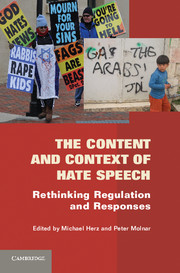Book contents
- Frontmatter
- Contents
- Contributors
- Foreword: Hate Speech and the Coming Death of the International Standard before It Was Born (Complaints of a Watchdog)
- Foreword: Hate Speech and Common Sense
- Acknowledgments
- Introduction
- Part I Overviews
- Part II Refinements and Distinctions
- 7 Social Epistemology, Holocaust Denial, and the Post-Millian Calculus
- 8 Denying Experience
- 9 What's Wrong with Defamation of Religion?
- 10 Responding to “Hate Speech” with Art, Education, and the Imminent Danger Test
- 11 Reconceptualizing Counterspeech in Hate Speech Policy (with a Focus on Australia)
- 12 Hate Speech and Self-Restraint
- 13 Hate Speech in Constitutional Jurisprudence
- 14 One Step Beyond Hate Speech
- 15 Hate Speech and Comprehensive Forms of Life
- Part III Equality and Fear
- Part IV International Law
- Index
- References
15 - Hate Speech and Comprehensive Forms of Life
Published online by Cambridge University Press: 05 June 2012
- Frontmatter
- Contents
- Contributors
- Foreword: Hate Speech and the Coming Death of the International Standard before It Was Born (Complaints of a Watchdog)
- Foreword: Hate Speech and Common Sense
- Acknowledgments
- Introduction
- Part I Overviews
- Part II Refinements and Distinctions
- 7 Social Epistemology, Holocaust Denial, and the Post-Millian Calculus
- 8 Denying Experience
- 9 What's Wrong with Defamation of Religion?
- 10 Responding to “Hate Speech” with Art, Education, and the Imminent Danger Test
- 11 Reconceptualizing Counterspeech in Hate Speech Policy (with a Focus on Australia)
- 12 Hate Speech and Self-Restraint
- 13 Hate Speech in Constitutional Jurisprudence
- 14 One Step Beyond Hate Speech
- 15 Hate Speech and Comprehensive Forms of Life
- Part III Equality and Fear
- Part IV International Law
- Index
- References
Summary
Introduction
This chapter attempts to justify a differential treatment of hate speech in accordance with the discourse to which it belongs. More specifically, it argues that hate speech that constitutes an integral part of a comprehensive and valuable form of life (what I will call “deeply rooted” hate speech) should be protected more stringently than hate speech that is not “deeply rooted.”
Two considerations justify greater respect for deeply rooted hate speech. First, when hate speech is part of a broader and more comprehensive and valuable form of life, its regulation expresses authoritative condemnation not only of the views or opinions censored, but also of the whole way of life of which they are a part. This is because hate speech that is part of such a comprehensive way of life is typically related to other foundational components of the tradition. Second, direct prohibition of such speech is both less necessary and less likely to be effective than prohibition of hate speech that is not deeply rooted. When hate speech is part of a comprehensive and valuable form of life, it is understood by those who share this form of life as part of a more comprehensive worldview. Therefore, on the one hand, there are prospects of reinterpreting the tradition in new and benign ways – ways that will transform the discourse and eradicate the sentiments of hatred. And, on the other hand, external legal intervention is unlikely to succeed in eradicating such sentiments. When hate speech is deeply rooted in individuals’ long-term customs, ways of life, and ideological commitments, when it is bound up with their identity, external direct intervention – in particular, criminal law, tort law, and other forms of coercive intervention – are unlikely to succeed in eradicating the sentiments of hatred.
- Type
- Chapter
- Information
- The Content and Context of Hate SpeechRethinking Regulation and Responses, pp. 306 - 326Publisher: Cambridge University PressPrint publication year: 2012
References
- 2
- Cited by



